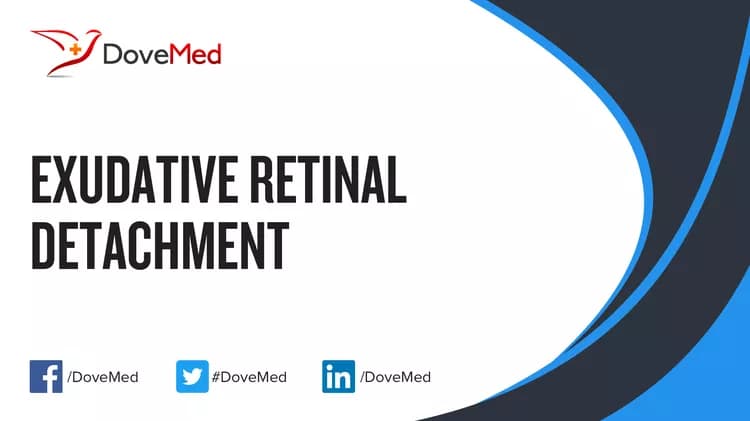What are the other Names for this Condition? (Also known as/Synonyms)
- Detachment of Retinal Pigment Epithelium (DRPE)
- ERD (Exudative Retinal Detachment)
- Serous Retinal Detachment
What is Exudative Retinal Detachment? (Definition/Background Information)
- Exudative Retinal Detachment (ERD) is a condition characterized by the accumulation of fluid in the layers of the retina, leading to its detachment from the underlying tissues. Unlike other forms of retinal detachment, exudative detachment is typically not caused by tears or breaks in the retina but rather by the leakage of fluid from blood vessels or abnormal fluid production in the eye
- The signs and symptoms of Exudative Retinal Detachment may include sudden vision changes, such as blurriness or distortion, a decrease in visual acuity, and the perception of a shadow or curtain obscuring part of the visual field. Patients may not always experience pain or flashes of light, which are more common in other types of retinal detachment
- The diagnosis of Exudative Retinal Detachment is made through a comprehensive eye examination by an ophthalmologist. Specialized imaging techniques, such as optical coherence tomography (OCT) and fluorescein angiography, can help identify the source of fluid leakage and assess the extent of retinal involvement
- Treatment of Exudative Retinal Detachment primarily focuses on addressing the underlying cause. This may involve managing conditions like age-related macular degeneration (AMD), diabetic retinopathy, or inflammatory eye diseases that contribute to fluid accumulation. In some cases, anti-VEGF (vascular endothelial growth factor) medications or corticosteroids may be used to reduce fluid leakage. Laser therapy or photodynamic therapy can also be employed to target abnormal blood vessels
- The prognosis for Exudative Retinal Detachment depends on the underlying condition and the effectiveness of treatment. Early diagnosis and appropriate management are crucial for preserving or improving vision in affected individuals.
Who gets Exudative Retinal Detachment? (Age and Sex Distribution)
- Exudative Retinal Detachment can affect individuals of various ages, genders, and medical histories
- It is commonly associated with conditions like age-related macular degeneration (AMD) and other retinal disorders
- Worldwide, individuals of all racial and ethnic groups may be affected
What are the Risk Factors for Exudative Retinal Detachment? (Predisposing Factors)
The risk factors for Exudative Retinal Detachment include:
- Age-related macular degeneration (AMD)
- Central serous chorioretinopathy (CSC)
- Retinal vascular diseases
- Diabetic retinopathy
- Inflammatory disorders affecting the eye
- Trauma or injury to the eye
- Tumors or neoplasms affecting the eye
It is important to note that having a risk factor does not mean that one will get the condition. A risk factor increases one’s chances of getting a condition compared to an individual without the risk factors. Some risk factors are more important than others.
Also, not having a risk factor does not mean that an individual will not get the condition. It is always important to discuss the effect of risk factors with your healthcare provider.
What are the Causes of Exudative Retinal Detachment? (Etiology)
Exudative Retinal Detachment (ERD) is primarily caused by the accumulation of fluid between the neurosensory retina and the retinal pigment epithelium (RPE), causing separation.
- This fluid accumulation is often a result of abnormal blood vessel growth, leakage from blood vessels, inflammation, or changes in the permeability of retinal tissues
- Unlike other forms of retinal detachment, exudative detachment is not caused by retinal tears or breaks but rather by an underlying condition that leads to fluid leakage
What are the Signs and Symptoms of Exudative Retinal Detachment?
The signs and symptoms may include the following:
- Sudden blurry or distorted vision
- Central vision loss
- A dark or gray area in the visual field
Unlike other forms of retinal detachment, exudative detachment might not present with flashes or floaters.
How is Exudative Retinal Detachment Diagnosed?
Ophthalmologists diagnose Exudative Retinal Detachment through the following tests and exams:
- Comprehensive eye examination, including dilated fundus examination
- The use of imaging techniques, such as ultrasound or optical coherence tomography (OCT) and fluorescein angiography, helps confirm the diagnosis and evaluate the extent of detachment
- Indocyanine green angiography
Many clinical conditions may have similar signs and symptoms. Your healthcare provider may perform additional tests to rule out other clinical conditions to arrive at a definitive diagnosis.
What are the possible Complications of Exudative Retinal Detachment?
If left untreated, Exudative Retinal Detachment can lead to irreversible vision loss and other complications associated with the underlying conditions causing the detachment.
How is Exudative Retinal Detachment Treated?
The treatment of Exudative Retinal Detachment (ERD) depends on the underlying cause; therefore, managing conditions, such as age-related macular degeneration, diabetic retinopathy, or inflammatory eye diseases that contribute to fluid accumulation is important. The treatment options for ERD may include:
- Anti-vascular endothelial growth factor (anti-VEGF) injections or corticosteroid therapy
- Laser therapy and photodynamic therapy for blood vessel abnormalities
- Surgical procedures to address the source of fluid leakage
How can Exudative Retinal Detachment be Prevented?
- The prevention of Exudative Retinal Detachment involves managing the underlying conditions that contribute to fluid leakage
- Regular eye examinations and early intervention for retinal diseases can reduce the risk of developing exudative detachment
What is the Prognosis of Exudative Retinal Detachment? (Outcomes/Resolutions)
The prognosis of Exudative Retinal Detachment varies and depends on the following factors:
- Underlying cause
- Promptness of treatment
- The extent of retinal damage
Early detection and targeted treatment offer the best chance for preserving vision.
Additional and Relevant Useful Information for Exudative Retinal Detachment:
The following DoveMed website link is a useful resource for understanding macular degeneration:
https://www.dovemed.com/diseases-conditions/macular-degeneration/
Related Articles
Test Your Knowledge
Asked by users
Related Centers
Related Specialties
Related Physicians
Related Procedures
Related Resources
Join DoveHubs
and connect with fellow professionals


0 Comments
Please log in to post a comment.